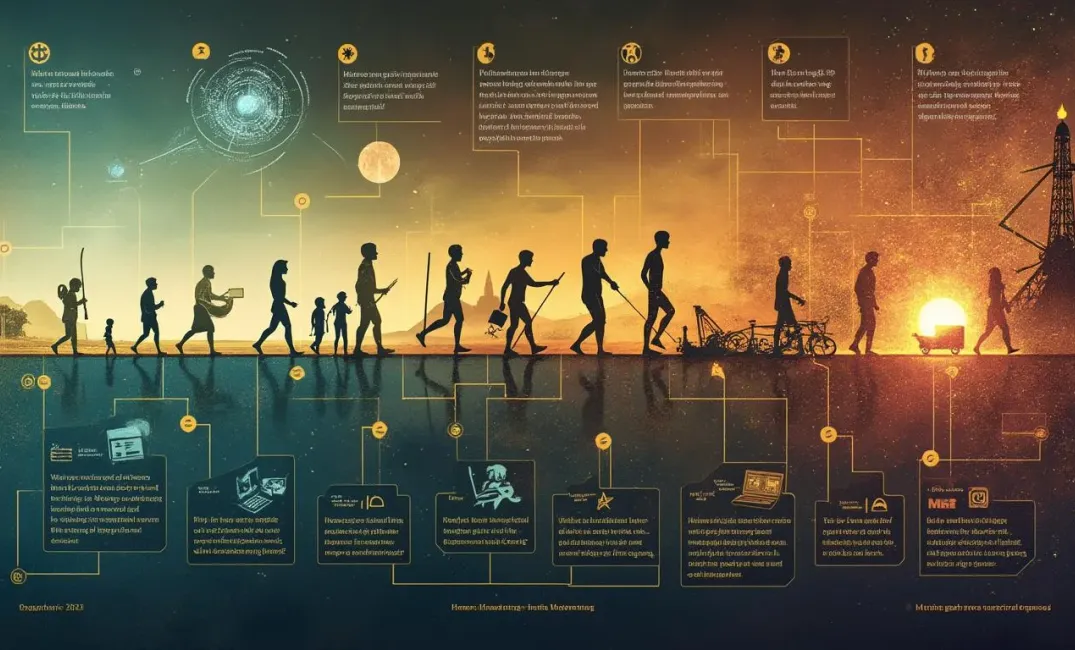Introduction: The Ever-Evolving Human Spirit
"Man is not made for defeat. A man can be destroyed but not defeated." — Ernest Hemingway
The ability to adapt is one of the quintessential traits that defines the trajectory of human evolution. From overcoming environmental changes to pioneering technological fronts, our species has continually transformed, displaying resilience in the face of adversity and change. This entry delves into the rich history of human adaptation, exploring how past challenges shaped societies and how present innovations continue to inspire future resilience.
Ancient Adaptations: Foundations of Survival
Early Human Migration
- Response to Climate Shifts: Early humans migrated vast distances in response to climatic changes. Adaptation to new environments involved developing clothing from animal hides, building shelters, and creating tools suited to local resources.
- Cultural Adaptation: Migration spurred cultural adaptation, as communities exchanged knowledge, technologies, and social practices, leading to a diverse tapestry of human societies and innovations.
Mastery of Fire
- Technological Leap: The control of fire represented a pivotal adaptation, providing warmth, protection, and a means to cook food, thus making nutrients more accessible and easing digestion.
- Societal Impact: Fire facilitated communal gatherings, enhancing social cohesion and cultural evolution, as shared stories and experiences around the hearth became vital components of community identity.
Medieval Responses: Systemic Resilience
Agriculture and Agricultural Revolutions
- Innovation through Necessity: The agricultural revolution introduced new crops and farming techniques, allowing societies to settle and form complex social structures. Political systems evolved as agriculture supported larger, stable populations.
- Feudal Systems and Innovation: Adaptations during medieval periods saw innovations like crop rotation and plow advancements, reflecting societies' responses to both economic needs and environmental demands.
Plagues and Public Health
- Epidemic Challenges: The Black Death decimated populations, but also led to social shifts and economic changes. Survival demanded innovations in public health practices, including quarantine measures and improvements in sanitary conditions.
- Cultural and Social Transformation: Population decline post-plague intensified labor demands, catalyzing the end of feudalism and paving the way for significant social mobility and eventual shifts towards modern economic systems.
Renaissance and Enlightenment: Shifting Paradigms
Intellectual Rebirth and Adaptability
- Scientific Discovery: The Renaissance heralded renewed exploration in science and art, embracing empirical methods as a means to understand and adapt to the natural world.
- Enlightenment Values: Philosophers promoted reason, equality, and scientific progress. Such ideologies spurred societal reforms and fostered environments furthering individual rights and systemic change.
Maritime Exploration and Expansion
- Navigational Breakthroughs: Advances in navigation and shipbuilding facilitated global exploration, reshaping economic connections and political power structures through expanded trade routes and colonial expansion.
- Cultural Synergy: The encounter and exchange of cultures across continents led to enhanced perspectives and innovation, albeit at significant human and cultural costs.
Industrial Revolution: A New Era of Adaptation
Technological Transformation
- Mechanization: The industrial revolution fundamentally transformed societies through mechanization, shifting economies from agrarian bases to industrial powerhouses. The steam engine revolutionized transport, manufacturing, and urban growth.
- Labor and Social Adaptability: Workers and societies had to adapt rapidly to meet industrial demands, leading to urbanization, changes in labor rights, and eventual expansion of socio-economic classes.
Environmental and Ethical Challenges
- Industrial Impact: The sudden growth of industry prompted environmental changes and health challenges, leading to early ideas of conservation and labor ethics discussions.
- Social Resilience: Community formations united through labor movements, solidifying resilience amidst exploitation and fostering dialogues around workplace justice and unionization.
Contemporary Challenges: A Global Adaptation
Digital Transformation
- Technological Society: The digital revolution redefined interaction, learning, and information processing, demanding adaptation to rapid technological advancements.
- Cultural Integration and Innovation: Societies adapted, fostering digital literacy and advancing global communication networks that bridge geographical and cultural divides.
Climate Resilience and Sustainability
- Environmental Awareness: Global warming and ecological crises necessitate innovative sustainable practices. Societies now focus on renewable energies, reducing carbon footprints, and establishing ecological consciousness in policy-making.
- Community and Policy Adaptation: Grassroots movements and international cooperation emphasize adaptation through resilience-building practices, advocating for green policies and sustainable community models.
Poli-Political and Social Movements
- Advocacy for Change: Recent social movements reflect societal adaptation through advocacy, embracing dialogue around race, gender, and rights, emphasizing collective identity and justice.
- Policy and Governance Integration: Governments adapt via legislation supporting diversity, fairness, and inclusion, featuring proactive governance to align with shifting social paradigms.
The Future of Human Adaptation: Emerging Frontiers
Technological Synergies
- AI and Robotics Integration: Humanity stands at a frontier where AI and robotics intersect with daily life, offering opportunities for enhanced healthcare, education, and work environments while posing new ethical and social challenges.
- Space Exploration: Adaptation will extend beyond Earth as humanity contemplates extraterrestrial colonization, challenging us to innovate isolated ecosystems and foster sustainable interplanetary habitation.
Socio-Cultural Resilience
- Diverse Transcultural Narratives: Adaptation prospects involve nurturing inclusive networks that respect individual narratives while fostering collaboration in global initiatives.
- Bioethical Considerations: Advances in biotechnology beckon societal adaptation in ethical discourse, exploring genome editing's moral implications alongside its potential for medical miracles.
Conclusion: Perspective on Human Resilience and Progress
"The measure of intelligence is the ability to change." — Albert Einstein
As we reflect on humanity's resilient and adaptive nature, we recognize the dynamic interplay between challenges and innovation. Our history, rich with remarkable transformations, highlights a tenacity lying at the heart of what it means to be human.
Adaptation ensures the continuation of civilization's narrative amidst evolving landscapes—social, technological, and environmental. It is the core melody that accompanies us through trials and triumphs, offering hope for a future that balances progress and sustainability.
In this symphony of adaptation, humanity showcases not just survival but the capacity to transform and enlighten. With wisdom gleaned through past lessons, we stride toward unknown destinies, relying on human ingenuity to illuminate pathways beyond challenge and toward enduring harmony.
EVOLUTION, RESILIENCE, DIGITAL TRANSFORMATION, HISTORY, GLOBAL CHALLENGES, SUSTAINABILITY, HUMAN ADAPTATION, ENVIRONMENTAL CHANGES, INNOVATION, SOCIETAL TRANSFORMATION

